Event Summary
Residential sector expands offer to fit shifting demands
As many people are spending more time at home and the office is being called into question, how is technology being used and adapted in residential real estate and where do we go from here, panellists at a PlaceTech event asked.
PlaceTech: Residential, was hosted by Place North West‘s sister publication PlaceTech and sponsored by Node, Bruntwood Works, Mills & Reeve and Mallcomm. This was the latest event under our new conference format, using a platform called Remo that enables networking on digital ‘tables’, as well as many other interactive features.
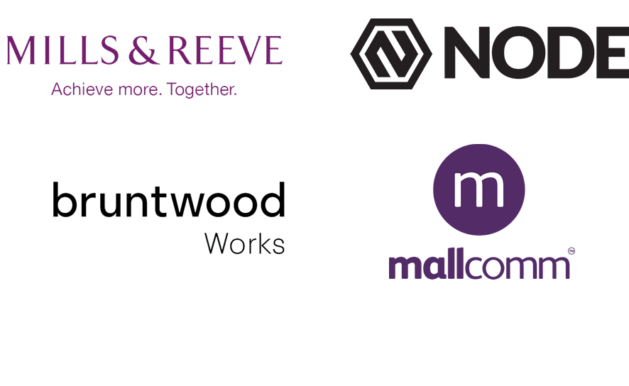
Ticketholders receive a copy of the video recording of the event. To buy access to the video for £25+VAT, email events@placenorthwest.co.uk
Key questions
- Is modular building now mainstream, and are buyers benefitting?
- How are technologies being used to support individuals and communities?
- How should developers go about choosing tech partners?
Main takeaways
- With the leisure sector shackled, the appeal of city living diminishes – but those building communities in cities have the ability to draw people together through better tech
- Co-living could rise on the back of poor quality in the houses of multiple occupation market, providing a smarter way of selecting who residents spend time with
- Much remains to be done in the senior living and care sectors, but former retail pitches, if not the buildings themselves, should suit development for retirement communities
Panel one
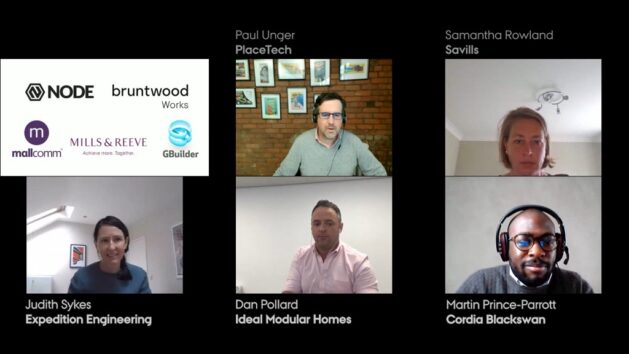
Martin Prince-Parrott, design manager, Cordia Blackswan
Samantha Rowland, director, senior living, Savills
Dan Pollard, chief manufacturing officer, Ideal Modular Homes
Judith Sykes, senior director, Expedition Engineering
In August, Liverpool-based Ideal Modular Homes landed a £300m contract with the Royal Borough of Greenwich – proof that off-site construction in the residential sector is now accepted? Ideal’s Dan Pollard said: “We certainly hope so – the methods we use and the speed we can deliver at are proven, the industry’s progressed massively in the last 15 years, and is fully accredited with the insurance and mortgage industries.
“We have both wired and wireless systems, depending on the spec; as an industry we’ve adapted swiftly to regulatory changes.
“Shortages in materials and labour in traditional building have been accentuated by Covid, but with the standardised, sustainable supply chains we have we’ve not been affected as badly – we have a fully functional factory, and supply of materials hasn’t dried up.”
Another prominent topic during Covid has been the rise in active travel, but are developers looking to factor this in? Judith Sykes said “there are forward-thinking developers who try and see things holistically” but that there’s a long way to go: “the majority of housing coming forward nationally is barely above building regulations, although the Future Homes Standard will help.”
Sykes said that evidence is emerging of renewed rural desirability: “We’re now seeing rural communities many thought of as unsustainable come to the fore, but how do you build home-working into that? How do you make it connected and affordable, with the infrastructure necessary to link into larger conurbations?
“We’ve been looking at this for two years and are now being inundated as people see the value of the model. No one wants to commute all the time, or be in their home all the time, so third spaces are key too.
“The reshaping of town centres is also topical. How do we re-zone urban centres to make them sustainable?”
For developer Martin Prince-Parrott, the appeal of modular is in clarity of cost and timeframe. He agreed that leaving the city is a theme:
“The biggest swing in interest right now is from urban core to suburban lower density. City living has been at the top of the agenda for a long time because of efficiencies, but take away socialising, restaurants, communities, what are you left with? Not enough, for too many people. They default to a human desire for space, the opportunity to exercise, and to be around a community that’s around more often
“How do you make it work? Design around people – the companies that excel, from Apple to Zoom, have fulfilled a need people have and moved quickly.”
“Co-living might grow, it’s a market created by often-poor HMO provision. The cost of renting a one-bed flat is prohibitive for some young people – living and working in one room isn’t ideal, so co-living can offer balance and community, the chance to be around people of your own age.”
“Repurposing retail is tough because with larger floorplates light doesn’t reach the centre.”
Provision of care and senior living space is much talked about, and Samantha Rowland confirmed there is a “distinct lack of supply”.
Affordability is also an issue. She said: “The mid-market is something everyone’s focusing on more now, getting more mixed tenures: rent, shared ownership, outright sale. Give people choice – at its core, this is about realising this generation is living independently for longer but also offering benefits of being part of an organised living community.
Rowland added: “I can see reworked shopping centres working: senior people want to be close to shops and cafes, they like to get out and enjoy retirement – some operators already starting to snap up retail facilities to redevelop for senior living.”
Panel Two
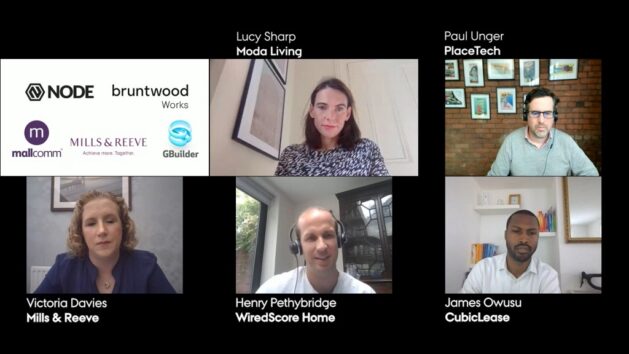
Lucy Sharp, head of corporate PR, Moda Living
Victoria Davies, principal associate, Mills & Reeve
Henry Pethybridge, director, WiredScore Home
James Owusu, founder, CubicLease
Lucy Sharp, presenting, said:
“Moda is a 2013-founded build to rent specialist, looking to establish next-generation neighbourhoods – Angel Gardens in Manchester opened last year and the Lexington in Liverpool opens next year.
“Tech plays a fundamental role in the day-to-day life of our residents, which started with our My Moda app, which allows people to manage what they need: concierge, rent payment, potential upgrades, reservations. During lockdown it kept people – our residents and more – connected, at one point we were screening events to 33,000 people: balcony workouts ,wine-tasting, cooking classes.
“We’re now partnering with Utopi. We can improve user experience hugely, the wellness of the building gives the best living experience, and measuring temperature, humidity, windspeed, CO2, all plays into that.”
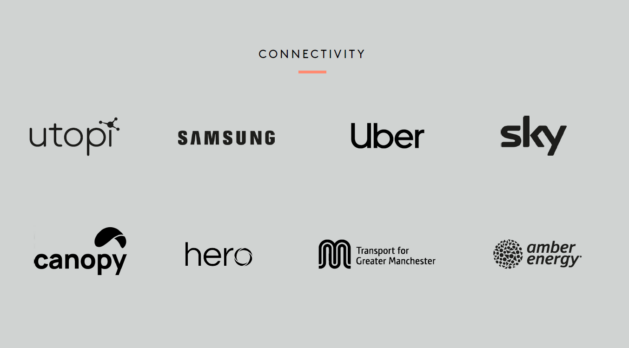
Moda’s partners help the developer use tech to improve the residents’ experience
Have people and places with greater tech felt the benefit during Covid? And how can tech be part of things in a future that looks less certain?
Henry Pethybridge said: “Covid has accelerated digital transformation and things are changing faster: we’re seeing a doubling down on futureproofing digital infrastructure to cope with buildings for five to 10 years. One challenge for residential developers is adapting layouts to support home working better.
“A better definition of smart buildings is needed, and we’ve created a ‘smart council,’ with 40 key players: it will work by focusing on user outcomes and build back to what tech empowers. We see four key areas: providing inspirational user experience, cost-effectiveness, performing well on sustainability, and being future-proof.
“Pervasive wifi is now essential in development: three years ago, people only expected it within apartments, so it wasn’t factored in, but people have so many devices now and expect seamless service. It’s not easy to retrofit for, so important to factor into current projects. Another factor is tall buildings: phone masts are only ten storeys tall, so people at the top of tall buildings absolutely need wifi.”
Sharp said: “It’s really important to build tech in as much as you can at the blueprint stage, Utopi have worked with us to design buildings with sustainability in mind, driving operational costs down, possibly by £3m to £4m across a development.
“We use aggregated anonymised data, protecting privacy, to show levels of use of facilities, and promote things accordingly, or over time dedicate more space to in-demand things, such as co-working space. The app keeps people up to date on workspace available, what’s being cleaned following use – being safe in that knowledge that you’re using a workspace that’s just been cleaned feels groundbreaking right now.
“It’s about using data to work out the best way to change how a building works in future.”
James Owusu said: “One of the things tech should enable is the speed people can move in, integrating different parts of the viewing and administrative processes. It needs secure information flow, and we provide that.
“We’ve talked about ‘hotelisation’ and things are heading that way for parts of the market. One area of interest is people coming in to work in different countries on short-term visas, and making that process as ‘easy in easy out’ as possible.
“Smart tech shouldn’t drive up prices – the key benefit is driving down operational costs, and a good developer should be able to fix problems without upping costs.”
Victoria Davies said that expectations are high at the top end: “Clients spending millions on a house expect everything to work straight away.
“There are more people leaving cities, now with a clearer idea of what they want: a home that will support two people home-working, but also home-schooling, it needs to have the data infrastructure, and also access to green space. The priority had been to be near transport links, but people are prepared to be further out now.
“With that in mind, tools like digital walkthroughs are hugely important – the VR experience will become the norm.”


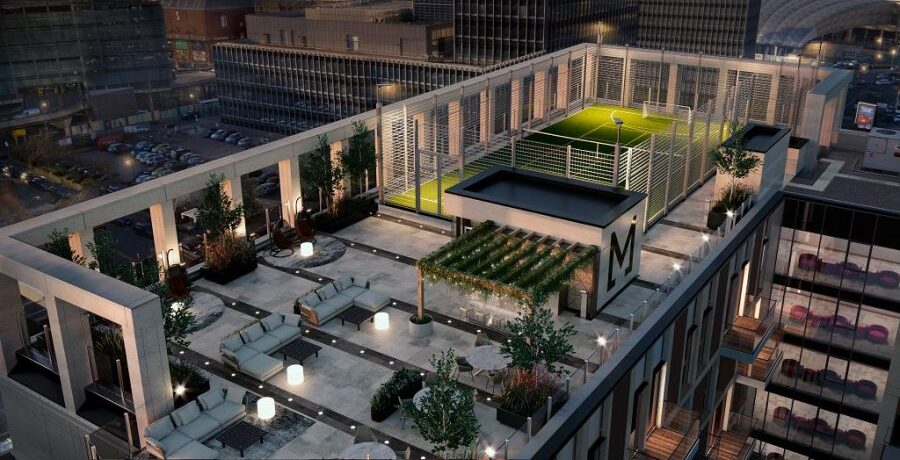
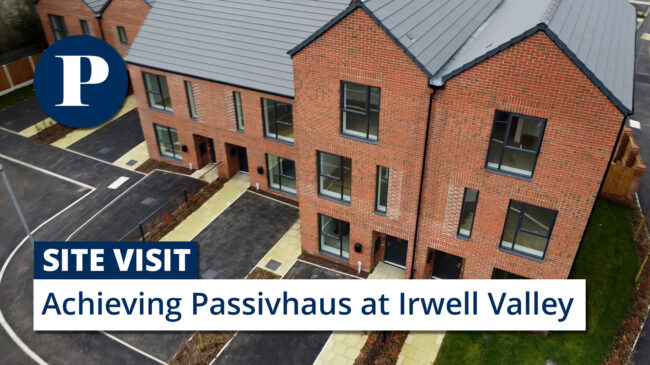
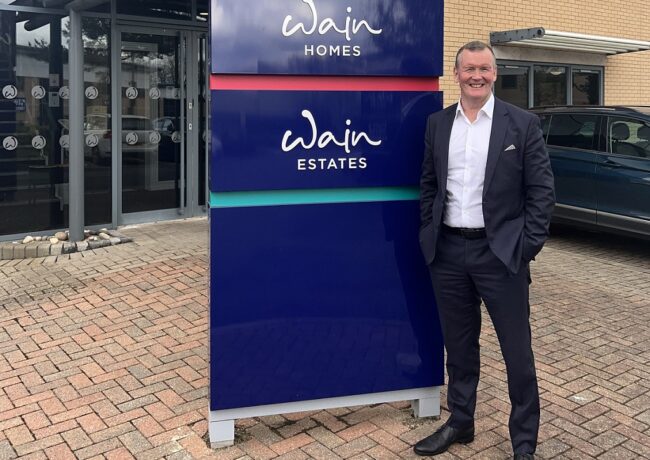
I love the way the render somewhat looks like we have some big Mediterranean style summer in Manchester with endless warm evenings 10 months of the year. It rains. A lot. Needs some canopies or something.
By EggManc